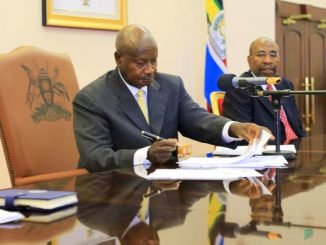
Kampala, Uganda | By Michael Wandati | Uganda’s President Yoweri Museveni has implemented a prohibition on the importation of secondhand clothing into the country, asserting that it hampers the growth of local textile industries. He argues that these clothes originated from dead people in Western countries.
Similar to many African nations, Uganda has historically relied on substantial imports of secondhand clothing, favored by consumers for its affordability.
For almost three decades, the bustling and crowded Owino secondhand market in Uganda’s capital has played a vital role in impacting the lives of many Ugandans.
However, a potential government ban on the sale of secondhand clothing now threatens to sever this crucial lifeline not only for the vendors but also for tens of thousands of employed workers in the trade.
The sprawling market, established in 1971, employs around 80,000 people, with 70 per cent of them being women, according to Kampala city authorities. At least 70 per cent of garments donated to charity in Europe and the United States end up in Africa, according to Oxfam, a British charity.
Joseph Barimugaya, who runs a stall with menswear, emphasized the widespread benefits of the trade, stating that even government officials, including ministers and Members of Parliament, purchase clothes from him. Mr. Barimugaya stressed that everyone benefits, including the government, which collects taxes.
Every day, hundreds of customers navigate the narrow alleys between makeshift wooden stalls, eager to find bargains. A secondhand Pierre Cardin blazer, for instance, is priced at Shs 40,000 ($11), a fraction of the cost of a new one.
While there are no official figures available, the Uganda Dealers in Used Clothings and Shoes Association estimates that 16 million people in Uganda, or one in three, wear used clothing.
The proposed ban on used clothing in Uganda has sparked debates about affordability, with many arguing that new clothing is financially out of reach for a significant portion of the population.
Also Read: Leso and khanga to get new EAC textiles boost
Allan Zavuga, retail manager of Think Twice, highlighted the environmental benefits of reusing clothing and criticized the potential ban for its adverse impact.
President Yoweri Museveni declared war on secondhand clothing, stating, “These clothes are from the dead in a foreign country. When a white (person) dies, the clothes are sent to Africa.” He expressed a desire to promote African wear.
Uganda’s State Minister for Trade, David Bahati, framed the issue as a matter of “dignity” and suggested that if the ban proceeds, the country can gradually replace second-hand clothes by incentivizing investors to process cotton into new garments.
Uganda had previously considered a ban on used clothing in 2016 as part of an East African initiative but faced opposition, partly due to diplomatic considerations. The East African Community (EAC) initially presented a united front, but internal disagreements led to Rwanda imposing steep taxes on used clothing in 2016. This move resulted in a significant drop in imports and led to the suspension of duty-free benefits for Rwandan apparel by the United States in 2018.
As Uganda revisits the possibility of a ban, the geopolitical aspects of previous attempts are far from the minds of sellers and shoppers at Owino.
Harriet Musoke Kyambadde, a second-generation shopkeeper, questioned the government’s decision to potentially ban secondhand clothes, expressing concern about the impact on her livelihood and the risk of falling into poverty.



